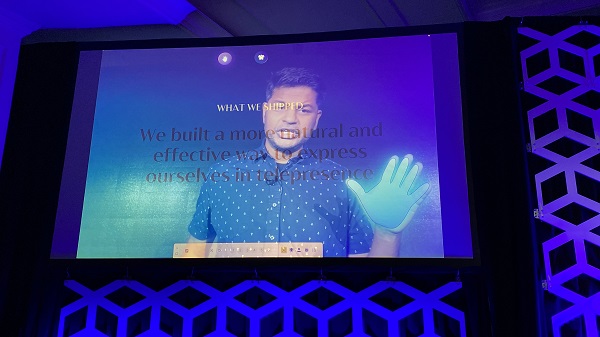Mobeus Cofounder Richie Etwaru Talks About Innovation, Telepresence and Building a Technology from Scratch
A great deal of innovation happens in New Jersey, and while much of the innovation in our ecosystem comes out of local universities and government-funded research, at other times the process begins with a person who has an idea and starts building and discovering, and then ends up securing a handful of patents on their own.
That’s the case with Richie Etwaru, cofounder and chief creative officer at Mobeus. We spoke with Etwaru recently and he gave us background on his unique company. The Sparta-based startup emerged from stealth in 2022 with $24 million in funding, and introduced its first product, Airglass, that same year. Etwaru’s cofounder is CEO Mike Sutcliff, former group CEO at Accenture Digital (Florham Park). Mobeus’ funding came from some ultra-high net worth individuals, and from Accenture Ventures, Etwaru stated.
Airglass, the first product in the market developed by Mobeus, is a video and audio communications tool intended to enhance virtual meetings by using “transparent computing” — a user-centric computing scheme “in which the hardware and software are separated in different places, to convert desktop software into a transparent, glass-like layer, giving the user the impression that they are looking beyond the display screen.”
Etwaru is a New Jersey serial engineer. His former company, Hu-manity.co, was founded in Princeton in 2018. It was based on the idea that humans, rather than big corporations or the government, should own their data. A blockchain company, it raised $5.5 million from angel investors. But when the COVID pandemic started, the company was one of the victims of the changed economy, Etwaru said.
As Hu-manity.co confronted the pandemic, Etwaru looked to the future. He realized that telepresence mattered and would become an exploding market, and he saw flaws in the current telepresence systems such as Zoom. Also, he said, “It turns out, you can’t really build anything good today without being beholden to one of the big technological giants. You can’t build without building on Microsoft, or Apple or on Google or on something else.”
That led to the idea of building something foundational, Etwaru said, something that could be a product, but also a platform. As a software engineer who had been issued patents previously, he wondered, “How do you build this technology?” Etwaru added, “I was looking for how to create something that floats on the screen and does not have anything to do with another app, so that presence can always be on the screen.”
Etwaru continued, “If you want to build presence into PowerPoint, you have to build it into PowerPoint only. And if you want to build presence into PDFs, you have to build it into PDFs only, right? The same for Zoom or [Microsoft] Teams. But I realized very quickly that we’re going to be using the computer for presence the way we use the phone, where that’s the thing that you’re on all day. And so, I started thinking that we need to build a solution where I can work and meet at the same time, where the meeting can be there, behind the computer screen. I knew we were going to have to do something completely different.”
What Etwaru and his team figured out was how to turn the whole front of the computer into an interactive 3D presentation and turn the entire display of the computer into immersive glass. Users can engage with the computer with their hands, and they won’t have to wear headsets, so they experience the computer screen in a whole different way. For example, they can draw in the air in front of the computer to circle items of interest. Think of it as 3D without the glasses.
Recently, Mobeus issued a press release about the patent portfolio supporting the company. The international law firm Oblon, with U.S. offices in Alexandria, Va., helped them with their submissions. Etwaru told us that Mobeus has submitted about 70 patents, and that 12 have been issued and are being pursued internationally. These days, Etwaru isn’t alone in writing the patents, as the company has hired people to do the underlying research for this technology. Mobeus employs about 40 people, with 10 of them living in New Jersey, he said.
The company is using Airglass as both a commercial product and a way to test the technology in the market. They have big plans for Airglass, taking telepresence places it has never been before. Etwaru believes that the product will revolutionize how people express their creativity. “Transparent technology is the future of self-expression,” the company said.
Etwaru pointed out that the user experience with Airglass isn’t as immersive as it is with virtual reality or augmented reality, but it “meets consumers right where they are right now.”
“We’re [consumers] are not ready to put on the headsets. However, we will add a little depth to our screen and some hand motion here and there. In other words, we do not think this technology will replace headsets; headsets will still exist. But, when using this technology, the screen becomes 3D instead of 2D, introducing a new way to operate the computer and a new way to communicate and collaborate.”
NJTechWeekly.com asked Etwaru about entrepreneurship and how he feels about being someone who discovers novel solutions to problems. He noted that he is from the Caribbean, and that the first time he unveiled the Airglass product on stage was at a conference in that region. He wanted his audience to know that “big innovation can come from anywhere,” he said. “It doesn’t have to come from Silicon Valley … I want entrepreneurship to be seen as something that is global.”
At that Caribbean conference, he spoke before high school students and people who looked like him, and showed them that “here’s a guy that looks exactly like you and came from the exact place like you, and he was able to find one or two big ideas in the world.”




